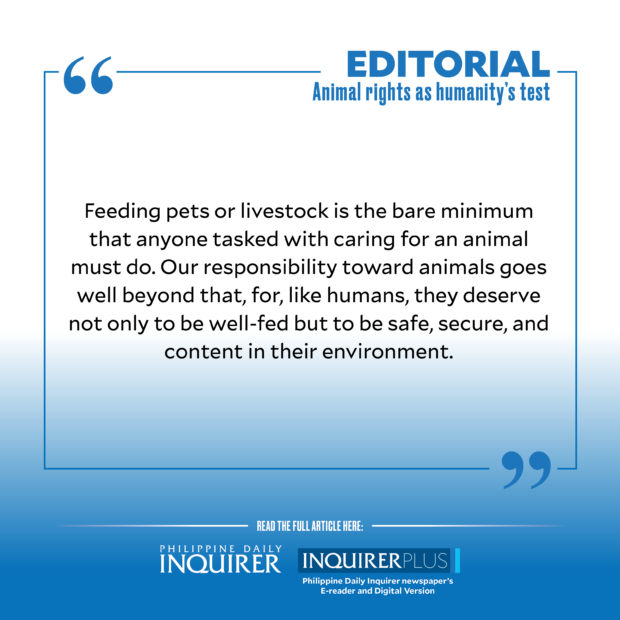Animal rights as humanity’s test

Humanity’s “true moral test,” the late novelist Milan Kundera wrote in his seminal work, “The Unbearable Lightness of Being,” “consists of its attitude toward those who are at its mercy: animals.”
By that standard alone, the Philippines has been an abject failure, in light of its culture of animal cruelty that extends not only to endangered wildlife but domesticated animals like livestock, strays, and the pets in our homes.
One example of the latter was the sad case of Killua, a golden retriever beaten to death by a resident of Bato town, Camarines province, on March 17. Killua’s owner Vina Arazas accused her neighbor Anthony Solares of mauling her three-year-old pet after the dog escaped from the house. Later, a video showed Solares chasing the dog before its lifeless body was found in a sack, triggering a social media furor.
Humane ways
The man claimed self-defense, saying the dog tried to bite him, and there are reports it tested positive for rabies, but the Philippine Animal Welfare Society said there are more humane ways to handle a rabid dog.
Before Killua, there was the case of the pets in the unfortunate care of the girl band 4th Impact.
In early March, the group’s members drew brickbats after they raised funds to purchase land where they planned to house their 200 shih tzus. Some were aghast at the conditions the dogs must have been put through, as they bred and multiplied in such staggering numbers uninterrupted.
Of course, there were grumblings against the inordinate public attention given to the purebred dogs in the two instances, when so many “aspin” or asong Pinoy, the colloquial term for mutts of mixed pedigree, are known to suffer even worse treatment, like the puppy thrown from a footbridge by a security guard in Quezon City in July last year or “Erika,” another aspin stabbed dead by a Korean in a Manila grill house on March 9.
The same is true of “puspin” or pusang Pinoy, the equivalent term for cats.
Starvation and cannibalism
Take the case of the neglected cats at a farm in Dasmariñas City in Cavite, which, according to reports, were in such terrible state they had resorted to cannibalizing each other. The matter came to light last week after a cat owner in the city found her missing pet at a farm owned by Jeffrey Fresni, village chief of San Jose, who had converted a section of his property into a pound for strays.
“Upon visiting the farm, the cat owner was dismayed to find her black cat, Macky, eating a deceased cat, a result of starvation,” animal welfare advocate Sherrie Hinojales-Matthews wrote in a letter to Interior Secretary Benhur Abalos.
Two more dead cats were seen at the property, the apparent “victims of starvation and cannibalism,” prompting local officials to investigate. In response, Fresni told the Inquirer: “There was no animal cruelty. We are spending money on sacks of food for their daily needs.”
Animal welfare literacy
But his words betrayed a fundamental misunderstanding of animal cruelty. Feeding pets or livestock is the bare minimum that anyone tasked with caring for an animal must do. Our responsibility toward animals goes well beyond that, for, like humans, they deserve not only to be well-fed but to be safe, secure, and content in their environment.
Last week, Sen. Grace Poe cited the need to integrate animal welfare literacy into the basic education curriculum, as she sponsored her pet bill seeking harsher penalties under the Animal Welfare Act of 1998, as amended.
In its present form, the maximum penalty under the law for any person who subjects an animal to “cruelty, maltreatment or neglect” that results in its death is one-year imprisonment and a fine not exceeding P100,000.
But the public is still woefully unaware that such a law even exists.
Legal consequences of animal cruelty
In a landmark case in May 2011, a court fined a University of the Philippines student for killing a cat in 2009, forgoing a prison sentence after he volunteered for community service. In October 2020, a couple in Quezon City were fined P36,000 after they were found guilty of animal cruelty for operating on a pregnant dog with a kitchen knife and scissors, killing the animal and its puppies. In June last year, a man from Dasmariñas was sentenced to up to three years in prison and ordered to pay P110,000 for stabbing a dog to death after he broke into the owner’s home.
As Poe noted, these incidents persist despite the law and punishments in place, underscoring the need for an aggressive government-led campaign to educate the people about responsible ownership of pets and livestock, as well as the legal consequences of animal cruelty.
Studies have shown that many animals that live among us, for whatever anthropocentric purpose they serve—companionship, service, or source of livelihood or food—are just as capable of complex emotions, like loyalty, love, and heartbreak, as the rest of us.
By constantly failing to give respect and dignity to these animals, we lose bit by bit the essence of what makes us human.




















